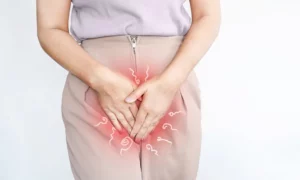Menopause is a natural phase in a woman’s life, signalling the end of her reproductive years. While it brings about various changes, one aspect that often remains under-discussed is the issue of painful intercourse during this transitional period. In this article, we will delve into the causes of menopause painful intercourse, its symptoms, and effective menopause painful intercourse treatment providing valuable insights for women navigating this challenging phase.
Contents
Understanding Menopause And Its Effects 
Menopause is a natural biological process that marks the end of a woman’s reproductive years. It is defined as the permanent cessation of menstruation and fertility and is typically diagnosed when a woman has gone without a menstrual period for 12 consecutive months. Menopause is a normal part of aging and usually occurs between the ages of 45 and 55, with the average age being around 51.
Here are some of the common effects and symptoms associated with menopause:
- Irregular Menstrual Cycles
Before reaching menopause, many women experience irregular menstrual cycles as the ovaries produce hormones inconsistently. This can lead to unpredictable and sometimes heavy or light periods.
- Hot Flashes and Night Sweats
Hot flashes are sudden, intense feelings of warmth, often accompanied by sweating and a flushed face. Night sweats are hot flashes that occur during sleep, leading to night-time awakenings and disrupted sleep patterns.
- Vaginal Changes
The decline in estrogen levels can lead to changes in the vaginal tissue, causing symptoms such as dryness, itching, and discomfort during intercourse. These changes may also increase the risk of urinary tract infections.
- Sleep Disturbances
Hormonal fluctuations and night sweats can contribute to sleep disturbances, leading to insomnia or difficulty staying asleep.
- Mood Swings and Emotional Changes
Hormonal fluctuations during menopause can impact mood and emotional well-being. Some women may experience mood swings, irritability, anxiety, or even depression.
- Changes in Libido
Hormonal changes and physical symptoms can affect a woman’s libido, leading to changes in sexual desire and satisfaction.
- Bone Health
Estrogen plays a crucial role in maintaining bone density. The decline in estrogen during menopause increases the risk of osteoporosis, a condition characterized by weakened and brittle bones.
- Weight Gain and Changes in Body Composition
Changes in metabolism and hormonal fluctuations can contribute to weight gain, particularly around the abdomen.
Causes Of Painful Intercourse
Painful intercourse, medically known as dyspareunia, can occur during menopause and is often related to changes in hormonal levels and the condition of the vaginal tissues. Several factors contribute to pain during intercourse in menopausal women:
- Vaginal Dryness
One of the most common causes of painful intercourse during menopause is a decrease in estrogen levels. Estrogen plays a crucial role in maintaining the health and elasticity of the vaginal tissues. As estrogen declines, the vaginal walls may become thinner and drier, leading to friction and discomfort during penetration.
- Vaginal Atrophy
Reduced estrogen levels can also result in a condition called vaginal atrophy, characterized by the thinning, inflammation, and loss of elasticity in the vaginal walls. This condition can make sexual intercourse painful and may cause irritation and burning sensations.
- Decreased Lubrication
Hormonal changes during menopause can lead to decreased vaginal lubrication. Insufficient lubrication can contribute to friction and discomfort during intercourse.
- Changes in pH Levels
The pH levels in the vagina are influenced by hormonal fluctuations. As estrogen levels decline, the pH may become more alkaline, creating an environment that is less conducive to healthy vaginal function and potentially leading to discomfort during sex.
- Pelvic Floor Changes
Menopause can affect the pelvic floor muscles, leading to weakness or tension. Changes in the pelvic floor can impact sexual function and contribute to pain during intercourse.
- Psychological Factors
Emotional and psychological factors, such as stress, anxiety, or a lack of sexual desire, can contribute to painful intercourse. Negative feelings or anxiety about the physical changes associated with menopause may also play a role.
- Medical Conditions
Certain medical conditions, such as infections, pelvic inflammatory disease, or endometriosis, can cause pain during intercourse. It’s essential to rule out underlying medical issues through a thorough examination by a healthcare professional.
Common Symptoms To Consider 
The symptoms can be physical, emotional, or a combination of both. Here are some common symptoms associated with painful intercourse during menopause:
- Vaginal Dryness
Decreased estrogen levels during menopause can lead to inadequate vaginal lubrication. This dryness can result in friction and discomfort during penetration.
- Burning Sensation
Women experiencing painful intercourse may describe a sensation of burning or irritation in the vaginal area. This can be related to changes in the pH levels of the vagina and the overall condition of the vaginal tissues.
- Thinning of Vaginal Walls
Vaginal atrophy, characterized by the thinning of the vaginal walls, can contribute to pain during intercourse. This thinning is a result of the decline in estrogen levels.
- Tightness or Tension
Some women may experience a sensation of tightness or tension in the pelvic region during sexual activity. This can be related to changes in the pelvic floor muscles or increased sensitivity in the vaginal area.
- Discomfort or Pain During Penetration
Pain during penetration is a hallmark symptom of dyspareunia. Women may experience varying degrees of pain, ranging from mild discomfort to sharp or stabbing pain.
- Post-Intercourse Discomfort
Pain or discomfort may persist after sexual activity is concluded. This lingering discomfort can impact a woman’s overall sexual satisfaction and may contribute to anxiety about future sexual encounters.
- Avoidance of Sexual Activity
Due to the pain and discomfort associated with intercourse, some women may develop a reluctance or aversion to sexual activity. This can have emotional implications for both partners.
- Emotional Distress
Painful intercourse can lead to emotional distress, including feelings of frustration, anxiety, or even sadness. These emotional factors can further contribute to sexual difficulties.
- Decreased Libido
The discomfort and pain associated with intercourse may result in a decreased desire for sexual activity. This can impact a woman’s overall libido and sexual satisfaction.
Treatment Options For Painful Intercourse During Menopause 
The treatment of painful intercourse during menopause involves addressing the underlying causes, relieving symptoms, and improving overall sexual well-being. Here are some common approaches to the treatment of painful intercourse during menopause:
Topical Estrogen Therapy
- Localized estrogen treatments, such as creams, rings, or tablets, can be prescribed to restore estrogen levels in the vaginal tissues. This helps improve the health and elasticity of the vaginal walls, reducing dryness and discomfort.
Systemic Hormone Replacement Therapy (HRT)
- For women experiencing multiple menopausal symptoms, including painful intercourse, systemic hormone replacement therapy (HRT) may be considered. This involves the use of estrogen and, if needed, progesterone to address hormonal imbalances. However, the use of systemic HRT carries potential risks, and the decision to use it should be individualized and made in consultation with a healthcare provider.
Non-hormonal moisturizers and Lubricants
- Over-the-counter or prescription vaginal moisturizers and water-based lubricants can provide relief from vaginal dryness and improve comfort during intercourse. It’s important to choose products that are compatible with the body and do not contain irritating substances.
Pelvic Floor Physical Therapy
- Pelvic floor exercises, often referred to as Kegel exercises, can help improve pelvic muscle tone and reduce tension. Physical therapy focused on the pelvic floor can be beneficial for some women experiencing pain during intercourse.
Counseling and Sex Therapy
- Emotional and psychological factors can contribute to painful intercourse. Counseling or sex therapy can provide support in addressing these factors, improving communication between partners, and helping couples navigate changes in intimacy.
Dilators
- Gradually increasing the size of vaginal dilators under the guidance of a healthcare provider or physical therapist can help stretch and relax the vaginal muscles, reducing pain during penetration.
Alternative Therapies
- Some women find relief through alternative therapies such as acupuncture or herbal remedies. However, the evidence supporting the effectiveness of these approaches is limited, and it’s essential to consult with a healthcare professional before trying alternative treatments.
Addressing Underlying Medical Conditions
- If painful intercourse is related to an underlying medical condition, such as infections or pelvic inflammatory disease, appropriate medical treatment may be necessary. Identifying and treating the root cause can help alleviate symptoms.
Lifestyle Modifications
- Making lifestyle changes, such as staying well-hydrated, maintaining a healthy diet, and managing stress, can contribute to overall vaginal health and may improve symptoms of painful intercourse.
It’s crucial for women experiencing painful intercourse during menopause to consult with a healthcare professional for a thorough evaluation and personalized treatment plan. The choice of treatment will depend on individual factors, including the severity of symptoms, overall health, and personal preferences. Open communication with a healthcare provider is key to finding the most effective and appropriate interventions for improving sexual well-being during menopause.
Lifestyle Changes
Beyond medical treatments, making certain lifestyle changes can contribute to managing symptoms effectively. Maintaining overall health through a balanced diet and regular exercise is key. These lifestyle adjustments not only support hormonal balance but also positively impact overall well-being.
Communication And Emotional Support
Open communication with your partner is essential during this phase. Understanding and support from your loved one can significantly ease the emotional burden associated with painful intercourse. Support groups and counseling are valuable resources for women navigating this challenge.
Conclusion
In conclusion, menopause-related painful intercourse is a challenging but manageable aspect of this life phase. By understanding the causes, symptoms, and available treatments, women can navigate this period with care and seek the support they need. It’s essential to approach the issue holistically, combining medical treatments, lifestyle adjustments, and emotional support for a comprehensive and effective approach.
If you are facing menopause related issues, menopause treatment at HerMantra can help. Book your free trial online menopause treatment session now.





